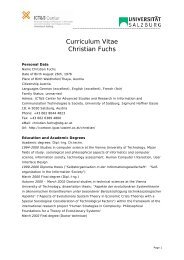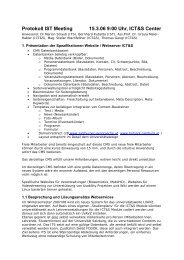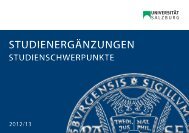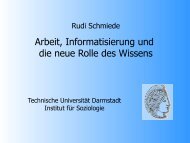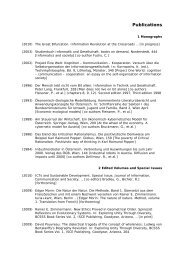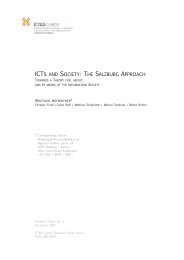CHRISTIAN FUCHS - ICT&S - Universität Salzburg
CHRISTIAN FUCHS - ICT&S - Universität Salzburg
CHRISTIAN FUCHS - ICT&S - Universität Salzburg
You also want an ePaper? Increase the reach of your titles
YUMPU automatically turns print PDFs into web optimized ePapers that Google loves.
Christian Fuchs: Social Networking Sites and the Surveillance Societyand avoid others that are considered as undesirable. Competitive interests andbehaviours are involved, the controlling group, class or individuals try to force thesurveilled to avoid certain actions by conveying to the latter that information on them isavailable that could be used for actions that could have negative influences on theirlives. Surveillance operates with threats and fear. It is a form of psychological andstructural violence that can turn into physical violence.David Lyon (1994, 2001) has argued that the intensification of surveillance by computertechnologies has resulted in a surveillance society. Surveillance is not the only mainfeature of contemporary society, there are a whole lot of others such as capital,knowledge, networks, flows, globalization, neoliberalism, etc. Hence the notion graspsjust one feature, which is nonetheless a quite important and dangerous one.After September 11, 2001, electronic surveillance has been intensified (Cf. Ball andWebster 2003, Lyon 2003, Webb 2007). Here are some examples:• In Newham, London, UK CCTV cameras are linked to the Mandrake facialrecognition software (Gray (2003) speaks of the rise of a facial recognition society inwhich thoughts that normally remain hidden to others are made visible with thehelp of new technologies). The UK has been at the forefront in the installation ofCCTV (Gras 2004, Webster 2004).• Biometrical iris scanners or facial recognition software for identity matching havebeen installed in numerous airports such as Frankfurt, Gatwick, Heathrow,Amsterdam Schiphol, Sydney, Melbourne, Boston Logan, or Manchester.• In Europe, the USA, and Canada, biometric passports with digital photos and RFIDcomputer chips that store personal data have been introduced. In Canada, suchpassports have no chip. Biometric passports shall make passports fraud resistant andenable identity authentication.• Immediately after 9/11, many Internet Service Providers agreed to install Carnivorecomputers, a data surveillance system operated by the FBI.• Based on the Alien Registration Act, fingerprints of several ten thousand Arabimmigrants were taken after 9/11 in the USA.• Section 201 of the USA Patriot Act that was passed in October 2001 allowed theinterception of wire, oral, and electronic communications relating to terrorism ifapproved by a federal judge.• Section 210 widened the scope of subpoenas for records of electroniccommunications to include e.g. identifying numbers such as temporary IP addresses• Section 217 allowed the interception of communications of a person who trespasses(access without authorization) a financial or US government computer.• Section 503 allowed the US state to collect DNA samples from offenders ofterrorism and violent crime.• Section 505 of the Patriot Act that allowed the FBI to obtain data on any user fromInternet Service Providers was declared unconstitutional in 2004.• Section 814 set the punishment for attempting to damage protected computers to upto 10 years in prison and the punishment for unauthorized access and subsequentdamage to up to 5 years in prison.• In late 2005 and in 2006, there were press reports and concerns that the NSAperformed warrantless eavesdropping on citizens’ phone calls and Internet traffic (cf.25



